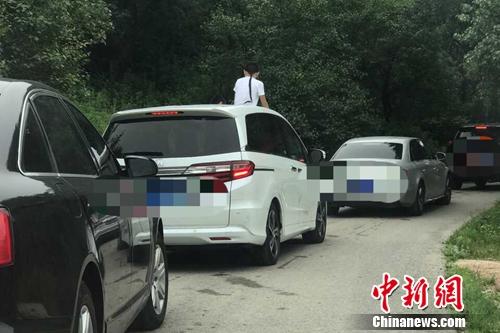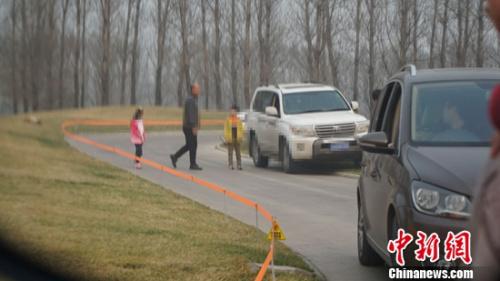Wildlife parks frequently expose tourists’ illegal lessons. Why are they repeatedly banned?
BEIJING, Beijing, July 26 (Shang Qi) Recently, the Badaling Wildlife World in Beijing, where the "tiger bites" incident happened, exposed two incidents of tourists violating regulations. On the one hand, the park repeatedly emphasizes the requirements for tourists to visit, and on the other hand, the dangerous incidents of tourists are constantly exposed. Why are the illegal incidents of tourists in the wildlife park still repeatedly banned after experiencing the "blood lesson"?

On the afternoon of July 22, 2017, in the Northeast Tiger Park of Badaling Wildlife World in Beijing, children repeatedly leaned out of the roof window, almost revealing half of their bodies. Photo courtesy of the event exposer
Badaling Zoo has repeatedly had tourists open windows and feed illegally?
The garden confirmed!
On July 23, 2016, a tiger wounding incident occurred in Badaling Wildlife World in Beijing, causing one death and one injury. After the investigation by the Yanqing District Government of Beijing, the result was clear. The victim Zhao did not abide by the "no getting off the bus" rule in the beast area and was injured by a tiger attack. Her mother was eager to save her daughter, did not comply with the regulations and got off the bus. She was attacked by a tiger and died. This incident is not a production safety responsibility accident.
Just one year after this tragedy, on July 23 this year, many media reported that on the morning of July 22, in Malai Bear Park, Badaling Wildlife World, some netizens photographed tourists being caught by bears for feeding bears. Also on the 22nd, in the Northeast Tiger Park, two children repeatedly leaned out of the skylight of the car, and one of them almost showed half of his body.
On July 25, the park confirmed to the reporter of Zhongxin. com that these two incidents did occur and were immediately discovered and stopped by patrol cars in the park. The two incidents lasted for a short time and did not cause personal injury or vehicle damage.
At present, it is the peak season of summer tour. Liu Weishi, director of the Badaling Wildlife World Office in Beijing, told the reporter of Zhongxin. com that the garden has sent more people, increased the inspection density, and added more security personnel. Specifically, each park has added a patrol car.
In recent years, tourists’ violations in zoos have occurred frequently. According to media reports, in June this year, three tourists crossed the back mountain of Changsha Wildlife Park in order to avoid tickets, and as a result, they strayed into the tiger stocking area. Fortunately, no casualties were caused. At the beginning of this year, in Youngor Zoo in Ningbo, a man climbed over the fence and entered the activity area of Hushan. He was found by a tiger and killed.
Some people think that although there are always "blood lessons", in reality, people who are lucky are still courageously rushing forward, bumping into the common sense and conscience of Chinese people again and again. This also shows that it is necessary for China society to further strengthen the awareness of rules and put an end to any form of "exception", "outside the law" and "outside the norm".

Data Map: On the morning of March 19, 2017, in Badaling Wildlife Park, tourists got off at the Beast Area. Photo courtesy of the reporter
Guarding tourists like minors?
In view of the personal safety accidents in the zoo, laws and regulations have always been clearly defined. Article 81 of the Tort Liability Law of People’s Republic of China (PRC) stipulates that "if animals in the zoo cause damage to others, the zoo shall bear the tort liability, but those who can prove that they have fulfilled their management duties shall not bear the responsibility."
Zhu Weiri, deputy director of the Communication Law Research Center of China University of Political Science and Law, explained in an interview with Zhongxin.com that this means that if the zoo can prove that it is not at fault for the damage results, it will not be responsible, which is stipulated by law.
In addition, the Tort Liability Law also requires that managers of hotels, shopping malls, banks, stations, entertainment places and other public places or organizers of mass activities should bear tort liability if they fail to fulfill their security obligations and cause damage to others. If the manager or organizer fails to fulfill the obligation of safety guarantee, he shall bear corresponding supplementary responsibilities.
"What is the standard of security obligations? Is it like an adult’s guardianship over a minor? I’m afraid not. " An Xiang, director of Beijing Dexiang Law Firm, who participated in the compilation of the Collection of Current Animal Protection Laws in China, told the reporter of Zhongxin.com that in a judicial interpretation on personal injury compensation issued earlier years, "the obligation of safety protection within reasonable limits" was clarified.
"Take the safari park as an example. First of all, we must set the tourists as people with full capacity, and not in a state of mental abnormality, lack of judgment and discrimination." An Xiang explained that if he is a person with full capacity, he should have a kind of self-knowledge about the danger of wild animals by default. On the basis of this self-knowledge, as a zoo, visitors should be made clear by signs, tips and other measures. In which area of the zoo, if you open the window and get off, your life will be in danger.
An Xiang said that if tourists don’t carry out sightseeing activities according to the common sense of people with full capacity, it is similar to suicide and self-mutilation. This kind of behavior is not unilaterally asking the garden to stop it.
"Is it necessary to monitor all tourists in the way of monitoring minors?" An Xiang asked, he said, if this is the case, for the vast majority of normal tourists, will the tour experience drop to a very low level, and will the operation of the whole society be lowered by IQ and efficiency?

The zoo has a power grid. Who lives in it?
Although the awareness of self-safety should be the common sense of tourists in the face of wild animals, and obeying the rules should also reflect the quality of human civilization, it is also indispensable to improve industry norms and better protect the safety of tourists.
According to media reports, china wildlife conservation association presided over the drafting of the "Wildlife Park Safety Code" in 2005, which stipulated that special personnel should be set up in the animal stocking area to maintain the order of sightseeing; To avoid direct contact between tourists and potentially dangerous animals, we should set up power grid devices to prevent animals from escaping in fierce animal stocking areas, and comprehensively check the cages, fences, protective nets, trenches, door locks and power grids of fierce animals every day.
Just after the tiger wounding incident in Badaling Wildlife World last year, the Northeast Tiger Park of the zoo added a power grid and a warning sign "No getting off the bus" at the exit gate, but it still failed to completely prevent the above-mentioned incidents of illegal window opening by tourists.
Zhu Wei, who has visited the zoo many times, told the reporter of Zhongxin. com that the power grid installed in Badaling Wildlife World is particularly thin. With the power grid, the effect of safety warning is even worse. "Some people are not afraid after knowing that there is a power grid. Some people even get off the bus and open the window because they think that the power grid can block the tiger."
An Xiang believes that the current laws and regulations are sufficient to deal with the safety accidents in zoos. If similar incidents become more and more common, the quality of tourists is getting worse and worse, and people should be more restricted than animals when they have to take certain measures.
Regarding the restrictions on people, An Xiang told the reporter of Zhongxin.com that it is a way to establish a "blacklist" of zoo visits similar to the social credit system.
"The zoo can operate on its own. Whether it is signing a notice or an agreement, it has certain legal effect in essence. A statement can be added to the notice, stating that if a tourist violates relevant regulations, the garden has the right to refuse his car, including visitors, to enter the zoo for sightseeing. Such a blacklist can be made by the garden. "
However, Liu Weishi told reporters frankly that he would not consider setting up a "blacklist" for the time being. "If you blacklist tourists, they may not cooperate with you. Although some tourists violate the rules, they are still consumers. We have no right to ask them not to come in the future. This will be complained."
An Xiang said that another way is that the zoo can make a "blacklist" from the perspective of protecting animals and maintaining normal visiting order, realize information exchange through animal protection related associations, and include unruly tourists into the "blacklist" of the entire zoo management system.

Extension — —
Should the safari park go on road trip be cancelled?
Whether you open the window or get off the bus while driving, or you are bitten by a tiger for ticket evasion, the last victims are not only people themselves, but also animals that conflict with them. The phenomenon that the tiger is "innocent" and the peacock is plucked from its feathers can’t help but make some netizens wonder whether the form of self-driving tour should be cancelled for the protection of wild animals.
Xie Yan, an associate researcher at the Institute of Zoology, Chinese Academy of Sciences, said in an interview with Zhongxin.com that wild zoos in foreign countries, especially in Africa, belong to in-situ protection, which is equivalent to a wildlife refuge in protected areas. It is the natural survival of local species in the local natural environment, which not only attracts a large number of tourists, but also really plays the role of protecting wild animals.
"But some safari parks in China raise all kinds of wild animals and put them in a closed environment for people to watch. Instead of protecting wild animals, they consume wild animals." Xie Yan said.
Nevertheless, An Xiang, who has been engaged in legal consultation in the field of animal protection for many years, believes that one of the social functions of the zoo is to give the public an opportunity to get in touch with wild animals, and the irrational behavior of a few people should not stifle the value of the existence of the wild zoo go on road trip. (End)